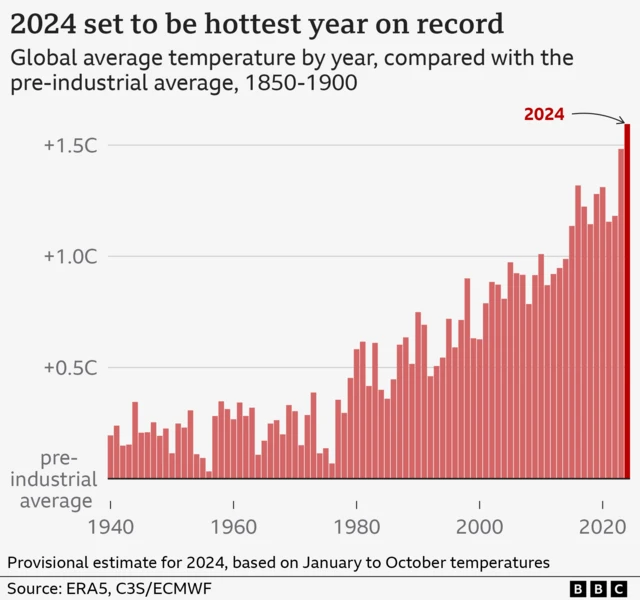According to the European Union’s space program, 2024 is “virtually certain” to be the hottest year ever recorded.
The prediction comes just a week before officials from the COP29 climate summit convene in Morocco. It also follows the election of Donald Trump as the new US president.
Trump has called climate change a hoax and vowed to roll back environmental regulations.
According to the report, it’s likely that 2024 will be the hottest year since the Industrial Revolution, which is a level of warming that scientists have warned about.

Dr. Samantha Burgess of the Copernicus Climate Service said that the record-breaking year should serve as a catalyst for the international community to raise its efforts to address climate change.
According to the scientists, the global temperature over the past 12 months was 1.62 degrees Celsius higher than the 1850 to 1900 standard.
It’s been estimated that human activities have contributed to this increase. In October, the climate service noted that it was the second-warmest month on record, with temperatures 1.65 degrees Celsius higher than pre-industrial levels.
The 15th month in a row that the global temperature has exceeded 1.5 degrees Celsius was also higher than the mark.
Despite the international community’s efforts to stop the increase of temperature, it’s still expected that the planet will continue to heat up by around 2 degrees Celsius by the end of this century.
Despite this, scientists say that they’re not able to predict exactly how long it will take for the Earth to reach this level.
According to Carlo Buontempo, the head of the Copernicus Climate Service, the rising temperatures are already pushing the ability of humans to adapt to and respond to extreme events to an absolute limit.
Data collected by various satellites, weather stations, and ships show that the world is experiencing unprecedented heat.
The ERA5 dataset, which the climate service uses, provides different data from other prominent climate data sets.
For instance, the scientists noted that the extent of Arctic sea ice reached its fourth-lowest level in October. In October, the Antarctic sea ice extent also reached its second-lowest.
They noted that heavy rains that hit several European countries, including Spain, caused flash floods that killed over 200 people.
The WMO reported last week that the concentration of greenhouse gases in the atmosphere reached record levels in 2023.
The scientists noted that the concentration of carbon dioxide has increased by more than 10% within the last two decades. It’s now been estimated that the greenhouse gas is contributing to the development of violent and extreme weather patterns.
According to the head of the climate service, the most effective way to address the climate issue is by implementing a global commitment to reduce emissions.

